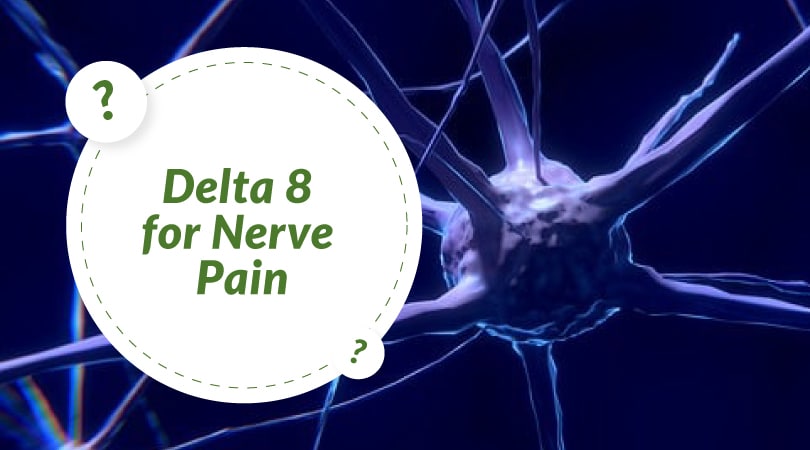
Delta-8 for Nerve Pain: Can It Really Help?
If you suffer from nerve pain, also known as neuropathic pain, you must know that it is one of the hardest pain conditions to deal with, as it often doesn’t respond well to traditional medication.
This is why more and more people are seeking alternative solutions. That’s where Delta-8 comes into play.
Delta-8 for nerve pain has become a promising potential option for those who are searching for relief in a more natural way.
Let’s explore whether Delta 8 can help with nerve pain, how it could work to help alleviate it, and how to use it effectively.
What Is Delta-8 THC?

Delta-8 THC is a cannabinoid found in the cannabis plant. It is chemically similar to Delta-9 THC, the main psychoactive component of cannabis, but with some important differences in its effects and potency.
Delta-8 THC is known for giving a milder high and it is suggested to offer the therapeutic benefits of THC without the intense psychoactive experience.
Delta-8 is generally more accessible than Delta-9 due to its classification under the 2018 Farm Bill. This has benefited the popularity of Delta-8 and has opened the doors for research into potential therapeutic uses.
What Is Nerve Pain?
Nerve pain comes from damage or dysfunction in the nervous system.
This type of pain can be caused by various conditions, including:
- Diabetes
- Multiple sclerosis
- Shingles
- Injuries such as spinal cord damage
What makes nerve pain so challenging to treat and deal with is that it is often chronic and doesn’t always respond to traditional treatments.
Common symptoms include:
- Sharp, stabbing, or shooting pain
- Burning or tingling sensations
- Numbness or reduced sensation
- Sensitivity to touch
- Muscle weakness
Another challenging characteristic of nerve pain is that it fluctuates in intensity, causing patients to feel better on some days and in severe pain on others without an exact cause behind the change, which makes it unpredictable.
Delta-8 THC for Pain Relief
So, does Delta-8 help with nerve pain? While research on Delta-8 THC and pain relief is still in its early stages and we cannot yet confirm its effectiveness for pain management, a recent study examined the effects of Delta-8 on the increased activity of the neural circuits and processes involving the neurotransmitter glutamate, the most abundant excitatory neurotransmitter in the brain, which plays a key role in synaptic transmission. In other words, it studied how Delta-8 could impact communication in human brain cells.
In this study, scientists used advanced genetic sequencing to see how Delta-8 impacts the expression of genes related to synapse functions (how nerve cells (neurons) talk to each other).
The results suggested that Delta-8 could increase the activity of genes involved in glutamate signaling, meaning it could have an impact on some physiological functions like mood, memory, and emotions.
Another study from 2022, which implemented an online survey for delta-8-THC consumers, suggests that Delta-8 THC may offer many of the benefits of Delta-9 THC without the side effects associated to the latter.
The survey, which gathered feedback from 521 participants, found that most Delta-8 THC users experienced relaxation (71%), euphoria (68), and pain relief (55%), with few reporting anxiety or paranoia. Participants also mentioned that they preferred the effects of Delta-8 from both Delta-9 and pharmaceutical drugs.
Further studies are needed to corroborate these results and understand their implications for pain sensation and relief, but they are a good start to understand how Delta-8 could potentially influence pain perception.
Benefits of Cannabinoids for Nerve Pain
Even though there is limited information on how Delta-8 could relieve nerve pain, there are broader studies that explore how cannabinoids could offer some potential benefits for those suffering from certain types of pain like nerve pain or fibromyalgia:
- Anti-inflammatory Properties: Research has pointed out that Cannabinoids could play an important role in reducing inflammation, a common cause of nerve pain.
- Pain Reduction: Other studies have looked into the effect of cannabinoids in animal models of pain, with positive outcomes. However, it is mentioned that further research is needed to understand how cannabinoids impact human sensation of pain.
- Mood Enhancement: Those who suffer from chronic nerve pain tend to experience low mood. Cannabinoids are linked to overall mental well-being, which can positively affect pain perception.
- Improved Sleep: Many patients with chronic pain suffer from sleep issues; and one of the most studied topics around cannabinoids is how they could help with better sleep, helping the body recover and reducing pain levels over time.
How to Use Delta-8 for Nerve Pain: Choose the Best Product for You

Delta-8 THC is available in many forms, each with its own advantages. You can choose the option that better suits your needs and personal preferences (tolerance, type of pain, like or dislike of vaping or smoking, etc).
Delta-8 THC Oil: Great for fast-acting relief. Taken sublingually (held under your tongue for 10 seconds), it enters your bloodstream quickly, offering relief within minutes that can last for several hours.
Delta-8 THC Cartridge: Discreet and convenient, pre-filled cartridges attach to a vape pen for easy use on the go. They offer precise dosing control with each puff and produce minimal odor.
Delta-8 THC Shatter: Highly concentrated, offering a stronger effect ideal for experienced users seeking powerful pain relief. However, it requires some type of equipment like a vaporizer, dab rig, pipe, bong, or joint.
Delta-8 THC Flower: It can be smoked or vaped using traditional methods. It offers the combined benefits of Delta-8 and CBG (the hemp flower used for infusion), which may enhance pain relief. However, smoking can irritate the lungs.
| Feature | Delta-8 THC Oil | Delta-8 THC Shatter | Delta-8 THC Cartridge | Delta-8 THC Flower |
|---|---|---|---|---|
| Tennis elbow |
Fast-acting (minutes)
|
Fast-acting (minutes)
|
Moderate (a few minutes)
|
Moderate (a few minutes)
|
| Duration |
Several hours
|
Several hours
|
1-2 hours
|
1-2 hours
|
|
Portability
|
High
|
Moderate |
High
|
Moderate |
|
Potency
|
Moderate
|
High | Moderate | Moderate |
|
Dosing Control
|
Precise (measured dropper)
|
Requires a bit of experience
|
Precise (puffs)
|
Requires a bit of experience
|
Delta 8 for Nerve Pain: FAQs
Can Delta-8 be used alongside other medications for nerve pain?
It’s better to consult with a doctor before using Delta-8 alongside prescribed medications to avoid potential interactions or complications.
What are some alternatives to Delta-8 for nerve pain?
CBD has also been linked to helping with some types of pain, although most of the evidence remains anecdotal.
How can I find a reputable source for Delta-8 products?
The quality and purity of Delta-8 THC are not always guaranteed as it is not currently regulated. That’s why we recommend you only buy Delta-8 products from reliable stores that run third-party testing.
What are the long-term effects of Delta-8 use?
Since Delta 8 is a relatively new option, research on long-term effects is limited.
Final Thoughts
So, even though we don’t have a definitive answer to whether Delta-8 helps with nerve pain, it has shown promising potential as a natural alternative for managing nerve pain. With its anti-inflammatory and pain-relieving properties, it could help improve the quality of life for those suffering from this condition.
If you’re considering trying Delta 8 THC for nerve pain, visit our store to learn more about our Delta-8 THC products and find the right ally for your nerve pain today.
References
Anchesi, I., Schepici, G., Chiricosta, L., Gugliandolo, A., Salamone, S., Caprioglio, D., Pollastro, F., & Mazzon, E. (2023). Δ8-THC Induces Up-Regulation of Glutamatergic Pathway Genes in Differentiated SH-SY5Y: A Transcriptomic Study. International journal of molecular sciences, 24(11), 9486. https://doi.org/10.3390/ijms24119486
Kamrul, R., Bunka, D., Crawley, A., Schuster, B., & LeBras, M. (2019). Navigating cannabinoid choices for chronic neuropathic pain in older adults: Potholes and highlights. Canadian family physician Medecin de famille canadien, 65(11), 807–811. https://pubmed.ncbi.nlm.nih.gov/31722915/
Kaul, M., Zee, P. C., & Sahni, A. S. (2021). Effects of Cannabinoids on Sleep and their Therapeutic Potential for Sleep Disorders. Neurotherapeutics : the journal of the American Society for Experimental NeuroTherapeutics, 18(1), 217–227. https://doi.org/10.1007/s13311-021-01013-w
Kruger, J. S., & Kruger, D. J. (2022). Delta-8-THC: Delta-9-THC’s nicer younger sibling?. Journal of cannabis research, 4(1), 4. https://doi.org/10.1186/s42238-021-00115-8
Markin, G. (2023). The Cannabis Paradox: Clarifying the Confusing Legality of Delta-8, THC-O, THCV, and Synthetically Derived THC. The National Law Review. Retrieved from https://natlawreview.com/article/cannabis-paradox-clarifying-confusing-legality-delta-8-thc-o-thcv-and-synthetically
Nagarkatti, P., Pandey, R., Rieder, S. A., Hegde, V. L., & Nagarkatti, M. (2009). Cannabinoids as novel anti-inflammatory drugs. Future medicinal chemistry, 1(7), 1333–1349. https://doi.org/10.4155/fmc.09.93
Vučković, S., Srebro, D., Vujović, K. S., Vučetić, Č., & Prostran, M. (2018). Cannabinoids and Pain: New Insights From Old Molecules. Frontiers in pharmacology, 9, 1259. https://doi.org/10.3389/fphar.2018.01259
